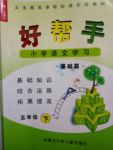题目内容
Is ____ dangerous to swim in the river alone?
- A.it
- B.this
- C.that
- D.he
解析:
本句it为作形式主语,不定式短语放在后面作真正主语。

 小学学习好帮手系列答案
小学学习好帮手系列答案 小学同步三练核心密卷系列答案
小学同步三练核心密卷系列答案Every Friday we have a fire alarm test at nine o'clock sharp, and even though the sound is very noisy, I am so happy because when I heard that it reminded me today is Friday and tomorrow is weekend, it is the last working day of the week and I have two days off, it’s so excited!Sometimes we have a fire drill, when you hear the fire alarm, everybody have to run out through the fire exit.
One Monday at nine o’clock, the alarm was sounded and I was working behind the fish house and didn’t hear it. The department manager and staff were looking for me thoroughly, finally they found me and asked me to stop my job and follow them went out.
"I am busy, No problem! You leave, I work." I said.
"No, this is the law, everybody has to leave." The manager said.
I understood that if I insisted not to leave, they must carry me out. I went out with them together finally, no choice.
One afternoon, when I was working outside, the fire alarm cropped up(突然出现) sounding wildly, nobody knew what’s happening, some were standing and looking around, some were asking questions, some were running, I knew this wasn’t a test or drill, must be a real one. At that moment, one lady called me from a distance:"Jinglebell: leave your job, go out quickly."I joined the crowded flow of customers and staff going out. I asked somebody what's happened? And they told me this is a real one as there was some smoke on the shop floor.Finally I found out, actually there was no problem, that it was an electrician who used the equipment for the carpet and made a little smoke.
After that I asked somebody how to deal with the customer’s food in the restaurant in that case, because they went out to leave because of the fire, but hadn't finished their food. They told me that the customers who had bought food or drinks there could get a new one.
I don't understand, if in China, under that situation, everybody must carry a bucket(桶) or some other water containers to the fire spot, to fight the flames.
I agree with the English emphasis the human right, but maybe a very small problem could become a big problem while everybody had withdrawn from the shop, because the fire fighters could not come at once.
I was just thinking.
1.Despite the noise from the fire alarm, the author still feels happy because _____.
|
A.the noise lasts too long |
|
B.the noise is not too loud |
|
C.the noise reminds the author of the coming of weekend |
|
D.the author often ignores it when working |
2.If there is a fire breaking out in a restaurant, what will happen in China?
|
A.people will go out to leave |
|
B.people will scream and cry in panic |
|
C.people will not leave until they finish their food |
|
D.people will carry a basket or some water containers to help put out the flames |
3.What’s the author’s attitude to the human right?
|
A.Approval |
|
B.Rejection |
|
C.Neutral |
|
D.Not mentioned |
4.Why does the author think that a very small problem may become a big one while everybody had withdrawn from the shop?
|
A.Because the author thinks the fire is dangerous |
|
B.Because the author thinks the fire spreads fast |
|
C.Because the author thinks the fire fighters could not come at once |
|
D.Because the author thinks the human right is important |
 When we found him, he
was a sorry sight. His clothes were torn, his hands bleeding. Before we reached
him, we saw him fall. He lay a moment. Then he pulled himself to his feet,
walked unsteadily a few yards through the woods and fell again.
When we found him, he
was a sorry sight. His clothes were torn, his hands bleeding. Before we reached
him, we saw him fall. He lay a moment. Then he pulled himself to his feet,
walked unsteadily a few yards through the woods and fell again.